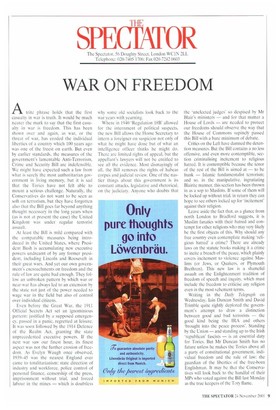SPECIAI E 'OR
The Spectator. 56 Doughty Street, London WC1N 21_,E Telephone: 020-7405 1706; Fax 020-7242 0603
WAR ON FREEDOM
Atrite phrase holds that the first casualty in war is truth. It would be much nearer the mark to say that the first casualty in war is freedom. This has been shown over and again, as war, or the threat of war, has eroded the individual liberties of a country which 100 years ago was one of the freest on earth. But even by earlier standards, the measures of the government's lamentable Anti-Terrorism. Crime and Security Bill are indefensible. We might have expected such a law from what is surely the most authoritarian government in living memory, but it is sad that the Tories have not felt able to mount a serious challenge. Naturally, the Conservatives do not want to be seen as soft on terrorism, but they have forgotten also that the Bill goes far beyond anything thought necessary in the long years when (as is not at present the case) the United Kingdom was under regular terrorist assault.
At least the Bill is mild compared with the comparable measures being introduced in the United States, where President Bush is accumulating new executive powers undreamt of by any former president, including Lincoln and Roosevelt in their great wars. And yet our own government's encroachments on freedom and the rule of law are quite had enough. They follow an unbroken pattern by which war or near-war has always led to an extension by the state not just of the power needed to wage war in the field but also of control over individual citizens.
Even before the Great War, the 1911 Official Secrets Act set an ignominious pattern: justified by a supposed emergency, passed in a panic, regretted at leisure. It was soon followed by the 1914 Defence of the Realm Act, granting the state unprecedented executive powers. If the next war saw our finest hour, its finest aspect was not the further erosion of freedom. As Evelyn Waugh once observed, 1939-45 was the nearest England ever came to totalitarianism: state direction of industry and workforce, police control of personal finance, censorship of the press, imprisonment without trial, and forced labour in the mines — which is doubtless why some old socialists look back to the war years with yearning.
Where in 1940 'Regulation 18B' allowed for the internment of political suspects, the new Bill allows the Home Secretary to intern a foreigner on suspicion not only of what he might have done but of what an intelligence officer thinks he might do. There are limited rights of appeal, but the appellant's lawyers will not be entitled to see all the evidence. Most dismayingly of all, the Bill removes the rights of habeas corpus and judicial review. One of the nastier things about this government is its constant attacks, legislative and rhetorical, on the judiciary. Anyone who doubts that the 'unelected judges' so despised by Mr Blair's ministers — and for that matter a House of Lords — are needed to protect our freedoms should observe the way that the House of Commons supinely passed this Bill with a bare minimum of debate.
Critics on the Left have damned the detention measures. But the Bill contains a no less offensive, and even more contemptible, section criminalising incitement to religious hatred. It is contemptible because the tenor of the rest of the Bill is aimed at — to be frank — Islamic fundamentalist terrorism; and so, in the manipulative, ingratiating Blairite manner, this section has been thrown in as a sop to Muslims. If some of them will be locked up without trial, in return they can hope to see others locked up for 'incitement' against their religion.
Leave aside the fact that, as a glance from north London to Bradford suggests, it is Muslim fanatics with their hatred and contempt for other religions who may very likely be the first objects of this. Why should any free country even contemplate making 'religious hatred' a crime? There are already laws on the statute books making it a crime to incite a breach of the peace, which plainly covers incitement to violence against Muslims (or Jews, or Quakers, or Plymouth Brethren). This new law is a shameful assault on the Enlightenment tradition of freedom of speech and inquiry, which must include the freedom to criticise any religion even in the most vehement terms.
Writing in the Daily Telegraph on Wednesday. fain Duncan Smith and David Trimble quite rightly deplored the government's attempt to draw a distinction between good and had terrorists — the good kind being the IRA and others 'brought into the peace process'. Standing by the Union — and standing up to the Irish 'republican' fascists — is an essential duty for Tories. But Mr Duncan Smith has no future unless he makes the Tories above all a party of constitutional government, individual freedom and the rule of law: the guardian of the liberties of the free-born Englishman. It may be that the Conservatives will look back to the handful of their MPs who voted against the Bill last Monday as the true keepers of the Tory flame.


















































































 Previous page
Previous page